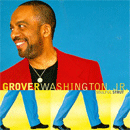 I sit here writing this almost five years to the day that this jazz legend left us. I realize that his shadow has grown larger, and that how impossible it is to replace him. I’ll never forget when the news came over the wire that Saturday morning that Grover had passed while taping a segment for television. My memory of seeing him at Capital Jazzfest just a few years before made me sad to think that he no longer would grace the stage with his presence. So it’s with reverence and respect that I look back at a disc of Grover's entitled Soulful Strut. I sit here writing this almost five years to the day that this jazz legend left us. I realize that his shadow has grown larger, and that how impossible it is to replace him. I’ll never forget when the news came over the wire that Saturday morning that Grover had passed while taping a segment for television. My memory of seeing him at Capital Jazzfest just a few years before made me sad to think that he no longer would grace the stage with his presence. So it’s with reverence and respect that I look back at a disc of Grover's entitled Soulful Strut.
Just listen to the opening, the title track "Soulful Strut," and you’ll know right away why this legend is so popular. Grover's ever-bopping soprano is upbeat and happy. "I tried to approach the Young-Holt Unlimited hit with fresh ears," says Grover, referring to the original version from 1968. "That was a beautiful time in my life. I was a sideman burning with energy and ideas. The music of the day, from Stan Getz to Sly Stone to Stevie Wonder, was inspiring to me. 'Soulful Strut' catches that vibe. I was going for that let's-walk-on-air feeling." It’s an uplifting song that keeps you singing along throughout its entirety. "When I start a record," said Grover "my aim to make a total statement. 'Soulful Strut's' statement is positive, and within its framework I approach each song as a self-contained short story." *
Next he covers the Peabo Bryson hit "Who Can Stop The Rain." It was a show-stopper when I saw him perform it, and his soul is exposed as he pours himself into this classic. Says Grover, "I loved Peabo's version... He sang with tremendous soul. I like to think of myself as a singer whose voice is a saxophone. I honor melody. I'd rather caress a melody than overwhelm it. I see myself as a servant of melody, a respectful interpreter. And the melody Walter Afanasieff wrote for 'Can You Stop the Rain' is gorgeous." *
"Play That Groove For Me" brings the tempo up with a Gary Haase/Maxwell Headman Haase tune written just for Grover. "Gary's especially sensitive to my spirit," says Grover. "He knows all the musical twists and turns of the past thirty years." "Groove's" fat groove was contributed by Maxwell, one of the bright lights of contemporary R&B. "Maxwell reminds me of Marvin Gaye," Washington comments. "For a man in his early twenties, he shows tremendous maturity. This 'Groove' is right in the pocket."* "Bordertown" is a song that reminds Grover of so many other towns that border rivers or small villages. "We all live within borders. That Bordertown might be Philly on the river, or it might be Camden across the river. The Bordertown might be in Africa. The idea is that we're all on a precarious edge--the edge of creativity or chaos, the edge of danger or discovery."* Chris Taylor’s guitar is showcased here as well as a lot of Grover’s soprano.
"I Can Count The Times" features Grover on tenor with a little bit of bass thrown in from Gerald Veasley. Grover’s soulful low notes at the beginning make for sharp contrast to the mid registrar melody of his tenor. "Village Groove" incorporates African rhythms and vocals. Said Grover, "A groove is a deep thing. Like the beat of our heart or rhythm of our breath, a groove expresses all that is human about human beings."* "Headman’s Haunt" begins with some guitar riffs from Chris Taylor and features Grover on alto. There’s a lot of good work here from him, and his solos are inspiring. "The haunt is the stomping ground, another variation of the bordertown, another global village. The headman is the cat charting the course for others to follow. Maybe he's the pied piper, or the saxophone player. He's the man with the groove." "Poacherman" features Grover on soprano as the African rhythms returns, and the vocals sing about one who takes without asking. "He's the dude running across the border," Grover explains. "He could be anybody--a thief who robs your food or steals your children's dreams. Or even a politician who legislates away your future. The mood of 'Poacher Man' says, 'Be wary; be aware.'"*
"Mystical Force" has that laid back jazz club feel to it. "'Mystical Force' has a similar subtlety. "This time I'm on alto, dreaming of a force you can feel but can't touch. I'm feeling a force that mixes darkness and light, like a walk through the Casbah, a journey combining apprehension and awe." * Uptown closes this classic with Grover finishing up on soprano and tenor. The sound is of a busy uptown street where the band wants to eventually go. "It's more than a geographic home; it's a spiritual haven, a place of higher consciousness where the grooves are right and the mood upbeat and joyous. I hope the SOULFUL STRUT takes us all uptown, a place where the world is safe and sane and filled with sounds that nourish our souls."*
The back cover of the inner sleeve features a close-up of Grover staring at us. You left us much too early, but we’re grateful for the legacy you left behind. Strut on ole soulful one, strut on…….
H.A. Cline
* from the Grover Washington web page |

